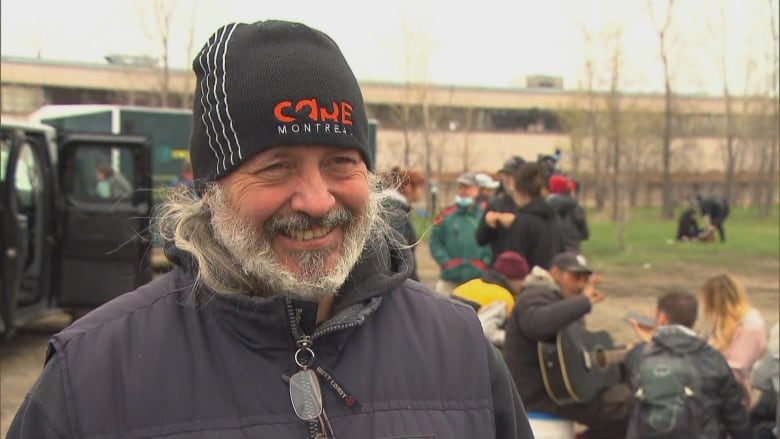Police force campers in Montreal's east end to leave after eviction notice served
About 20 people had been living at makeshift camp, set up after one nearby was deemed a fire hazard

Days after an eviction notice was served to people living at a homeless encampment in Montreal's Hochelaga neighbourhood, police have forced them to leave.
Dozens of activists protesting the eviction were at the camp Monday at around 6 a.m., but by 12:30 p.m. police began to dismantle a smaller camp nearby and approached the main camp, telling people to leave.
The eviction operation was delayed by protesters blocking access to the site, but police moved in and dispersed the group of 20 or so protesters just after 4 p.m. Most of the campers had already left the site voluntarily.
After that, city crews began clearing the site.

About 20 people had pitched tents and parked small campers in the Boisé Steinberg, a wooded area owned by Quebec's Transport Ministry on an industrial strip of Hochelaga Boulevard near Viau Street in the east end.
The camp, which included carpets and couches in outdoor living areas, had been deemed secure by the Montreal fire department.
Last December, firefighters condemned a similar tent city on a roadside green space just east of the Jacques-Cartier Bridge, finding its generators and propane tanks to be a fire hazard.
This time, the Transport Ministry itself served the eviction notice, saying the camp posed a safety risk.
A bed for everyone
Nathalie Goulet, city councillor for Ahuntsic-Cartierville and the executive committee member responsible for homelessness, spoke with reporters in front of the encampment on Monday.
She emphasized that there is no lack of shelter beds available for people, and that everyone who will be removed from the camp will be offered a bed and access to services.

"We can assure you that every person here has a shelter bed for tonight," she said. Goulet added that there are double the amount of shelter spaces available compared to before the pandemic, including for women, young people and Indigenous people.
Goulet explained that city hall supports the eviction action, saying that it sends a clear message about Montreal's stance.
"We are firm on the question of organized encampments, we can't tolerate them," she said.
"We cannot tolerate the risk of tragedies such as those which were narrowly avoided at the camp Notre-Dame last fall when a tent caught fire near a propane tank."
Goulet said that in order to support people who were being forced out, the city mobilized its partners and brought in social workers, health workers and fire prevention staff.
When asked if the city was open to establishing a permanent outdoor site where people could camp legally, Goulet responded the long-term solution is social housing, not campgrounds.
"Our administration is working day by day on that since the beginning of our mandate," said Goulet.

The camp was one of several that have cropped up on vacant green spaces, often around industrials areas, in the city in the past year.
Eviction won't solve problem, says advocate
Organizations that work with the homeless population, including Care Montreal, have spoken out against dismantling encampments, saying it doesn't solve the problem.
Michel Monette, director of CARE, told CBC that "the camp is not the tents and trailers, the camp is the people."
He said tearing down the site and forcing people to leave won't drive them back to shelters. Instead, they will just find another outdoor location.
"We disagree with this way of doing things," said Monette.

Despite the availability of shelter beds, Monette explained why some people prefer sleeping outside.
"[They] choose to go in a place where you are in control of your own life, instead of going to a place where someone controls your life," he said. "That's the reason. It's very simple like that."
He said rather than evict people from the site, officials should work to secure it and make it a safe place for people to live until they can be moved into transitional housing.
Montreal Mayor Valérie Plante has acknowledged the rise in homelessness since the beginning of the pandemic, as the economic fallout pushed several already on the margins into the street.
Plante said there is no official data yet but she estimates the number of people living without a home has doubled.